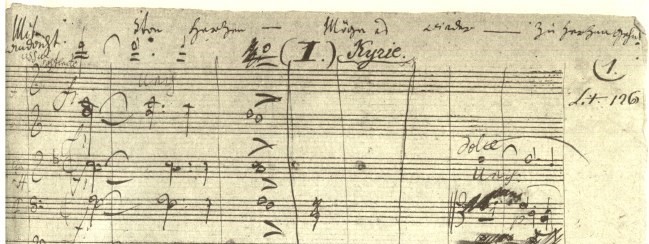
Inscribed at the top of Beethoven’s original score of his Missa solemnis are the famous words “Von Herzen—Möge es wieder—Zu Herzen gehn!” (“From the heart – may it return to the heart!”).
Beethoven sought to fulfil this expression of deep emotion throughout the work, whilst retaining his lifelong musical principles of order and unity.
Throughout the Missa solemnis, we witness Beethoven’s own deep sense of spirituality, as well as a sense of his personal struggles, through the lyricism of the Kyrie, the energetic Gloria, the virtuosic fugue of the Credo and the ethereally beautiful Benedictus. The final Agnus Dei, a desperate plea for peace amid the horrors of war, resonates with us now as it did in Beethoven’s day.
Beethoven began work on the Missa solemnis in 1818, within a political and cultural climate marred by war and instability, starting with the French Revolution of 1789 and culminating in Napoleon’s defeat at the Battle of Waterloo in 1815. The reinforcement of the old conservative order, following Napoleon’s defeat, did not play to Beethoven’s advantage: under the repressive regime of Prince Klemens von Metternich, where artistic freedom was disapproved, Beethoven became a target of official suspicion seen in the surviving secret police report on the composer. Meanwhile in 1814-15 Beethoven was struggling with several personal difficulties, including the realisation of his increasing deafness, which would destroy his prospects as a performer, as well as the death of his brother Caspar Carl.
It is not surprising, therefore, that the full extent of human emotion and strife is a defining characteristic of Beethoven’s late masterpiece – and brought to a peak in the final movement, the Agnus Dei. Noted Beethoven authority Stephen Johnson comments:
“The darkly intense opening prayer for mercy, led by the bass soloist, is set in B minor, the key Beethoven characterised as ‘black’. Tempo and mood become more animated and hopeful at the words ‘Dona nobis pacem’ (‘Grant us peace’). But before long something extraordinary happens: threatening martial fanfares are heard, distantly at first but with growing menace, in the ‘alternative’ key of B flat. The soloists’ prayers for peace (marked ängstlich, ‘fearfully’) take on an almost desperate urgency, which only intensifies when this martial assault returns, with still greater force, at the climax of the movement… Eventually peace does return, and yet the timpani can still be heard just before the end, quietly reminding us of the now dissonant B flat – the threat is not banished.”
Johnson continues by drawing a comparison with words from Beethoven himself, written as he was contemplating writing an opera in his final years:
“Perhaps the dissonances throughout the whole opera might not be quite resolved, or else in some totally different manner, for our civilised music cannot be conceived in such weird and desolate times.”
As Johnson writes,
‘Dissonance’ that is ‘not quite resolved, “is a perfect description of the conclusion of the Missa solemnis. It gives that ending a strangely modern quality. There can be no doubting the sincerity of Beethoven’s expression of faith in God, as sensed ‘inwardly’, yet like many today he seems to find it difficult to reconcile the idea of a loving, all-powerful father with the brutal fact of human suffering.’
Even the Orchestre Révolutionnaire et Romantique’s ground-breaking recording of the piece was poignantly timed, being recorded in the week of November 1989 – during the fall of the Berlin Wall. As John Eliot Gardiner later commented, this collision of circumstances only seemed to heighten the spiritual experience of the performance. The recording featured a choir of 36 and an orchestra of 60 period-instrument players, and when it was finally released (in 1991) it bumped Paul McCartney’s Liverpool Oratorio from the number-one position on the classical charts. It also won numerous awards, including ‘Record of the Year’ from Gramophone magazine.
Today, Beethoven’s Missa solemnis remains as relevant and powerful as ever. The Monteverdi Choir and the Orchestre Révolutionnaire et Romantique will, as ever, shine in this demanding score - offering a deep and personal expression of emotion: “Von Herzen—Möge es wieder—Zu Herzen gehn!” for us all.
Listen to the 2014 Monteverdi Choir and Orchestre Révolutionnaire et Romantique recording of Beethoven’s Missa solemnis below or purchase a the CD/Digital download here.